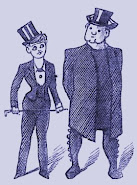
Frederick Wertham did not begin his crusade against comic books until May 29, 1947 in the Saturday Review of Literature. In 1945 Chicago the Southtown Economist preceded him with a series of sensational front-page articles on the “Crime and Superbeing Philosophy,” which they felt was being promoted through comics. The vigilantism of the comic book heroes apparently undermined children’s confidence in the police and the legal system. The articles were short on facts but long on hyperbole. The Economist “leafed” through a stack of the current newsstand comic books, and what they found was shocking. A detailed examination of several titles found the following:
“In one of them an Indian discovers an attempt to smuggle aliens into the United States at a mythical point where the boundary is a river which flows through a precipitous gorge. He foils the attempt by smashing one man’s head with a stone and killing the others with arrows from his bow. Only then does he start after the Sheriff. This is alright, the story implies, because the Indian’s son is in the army.”
In another story this sentence appears: “He had been prominent in government work until suddenly and inexplicably, he had been changed from a clear-thinking patriot to one of the country’s most rabid isolationists.” In other words, this “comic” magazine tells its child readers that anyone opposed to intervention is not a patriot, and therefore necessarily is a traitor. It thus teaches the same kind of intolerance that was characteristic of the Nazi Germany that is now dying.
Around the same time the Economist was comparing comic books to the fascism of the Nazi’s and the Superman philosophy of Neitchze, J. Edgar Hoover considered them the work of the communists: “Some of the influences for delinquency are the crime books, crammed with anti-social, criminal action. The glorification of un-American vigilante action, and of the criminal, are extremely dangerous in the hands of the unstable child.”
“Funnyman” is the name of the next “comic” magazine character. Funnyman is a criminal whose face has been distorted into a permanent smile. He kills his victims by making them laugh themselves to death. He always outwits the police. In this story he murders a police detective by smothering him with a gigantic balloon which he blows up mechanically in the detective’s bedroom. In this story no suggestion of retribution is apparent. Funnyman escapes and the story tells us in advance the police are unable to determine how the detective died.
Another “comic” magazine story is about “Archie,” an adolescent who is always getting into trouble, always falling over his own feet as it were. In this story he sends his friend to break an appointment with a dentist who is so stupid he forcibly puts Archie’s friend into the chair and extracts two teeth. The “friend” later knocks out three of Archie’s teeth.
These fairly mild examples were followed by an explanation of “The Superbeing Philosophy:
We have told repeatedly of the subject matter of these “comic” magazines. We have told how their subject is crime, physical assault, and general bestiality. We have told how they reek with suggestive art, with pictures of women whose feminine characteristics are over-emphasized. We have told of their vulgar and incorrect speech, of the sadistic acts they portray, of the vulgar behavior they present. We have emphasized that through many of their sequences stalks the figure of a hooded “justice,” a superbeing who knows all, sees all and can do all. He rights wrongs by superseding God-made laws and takes unto himself all the powers of all men by assuming he has the right to punish -- to punish even with death.
It is this superbeing philosophy that the Economist has found particularly vicious. It is this philosophy of the need of a superbeing which we have attacked. The Economist has shown, too, how physical monstrosities stalk the pages of the “comic” magazines, fit subjects for the nightmares of impressionable children.














Wow! Who was the "Southtown Economist" anyway? The hysterical tone of the article gets in the way of an occasional good point (as was the case with Wertham's book), but at least I know now why I needed glasses...all those jumbled panels.
ReplyDeleteFor my money, "Funnyman" sounds like a misnamed Joker story. Care to parse for me the Indian story? What exactly does it mean, "Only then does he start after the Sheriff"? And exactly what is supposedly all right because his son's in the army...killing the smugglers or "going after" the Sheriff? What a mess of an article.
Very nice work. I linked to this from my blog: http://andrewwales.blogspot.com/2010/02/comics-on-trial.html
ReplyDelete